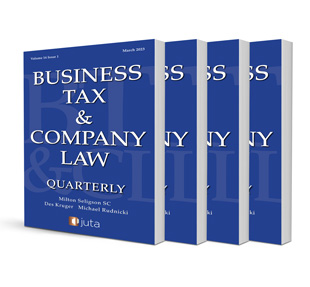
Hidden Complexities in the Right of Recourse Between Co-debtors and Co-sureties
Authors: Leon Kuschke SC, John Butler SC and Matthew Blumberg SC
ISSN: 2219-1585
Affiliations: Members, Cape Bar
Source: Business Tax & Company Law Quarterly, Volume 15 Issue 4, 2024, p. 9 – 20
Abstract
Does a co-debtor or co-surety who is called upon to pay, and does pay, more than his or her proportionate share of the principal debt enjoy an ex lege (i e automatic) right of recourse or contribution against his or her co-debtors or co-sureties? This is the question that the authors — sitting as an arbitration appeal panel of three — were called upon to answer in recent arbitration proceedings.
The common assumption, amongst lawyers and businesspeople alike, is that there is an ex lege or automatic right of recourse or contribution in these circumstances. However, as appears from the analysis below, that assumption oversimplifies the legal position — which, on an overview of the relevant authorities, has two central tenets.
The first is that the default or presumptive position is that co-debtors and co-sureties do enjoy a mutual right of recourse or contribution in the circumstances described above.
The second is that the default or presumptive position may be displaced by the nature of the underlying relationship between the individual co-debtors or co-sureties. It is their underlying relationship — not merely the existence of a relationship of co-debtorship or co-suretyship — that is ultimately determinative of whether or not a mutual right of recourse or contribution exists.
As an example, assume that budding entrepreneur A wishes to start a business. A seeks to borrow R100 as start-up finance from lending institution X. To satisfy X’s requirements in respect of security, A’s wealthy relative B agrees to assume personal liability, jointly and severally alongside A, for repayment of the loan. The position then is that Y, as creditor, is owed R100 by A and B as co-principal debtors.
On settling the loan in full, does A then enjoy a right to recover R50 (half of the total debt paid by A) from his co-debtor B?
On the common assumption referred to above, the answer would be yes. But the legal principles, properly understood and applied, yield the opposite answer. Unlike A, B (the wealthy relative) has no genuine interest in the advance of the loan. The law recognises that in these circumstances, the underlying relationship between A and B is inconsistent with the latter owing the former an obligation to relieve him or her of the full debt burden (i e by distributing it between the two of them).
In this example, the nature of the underlying relationship between the co-debtors A and B — which, again, is inconsistent with a mutual right of recourse or contribution between them — has the result that the default or presumptive position is displaced and does not apply.